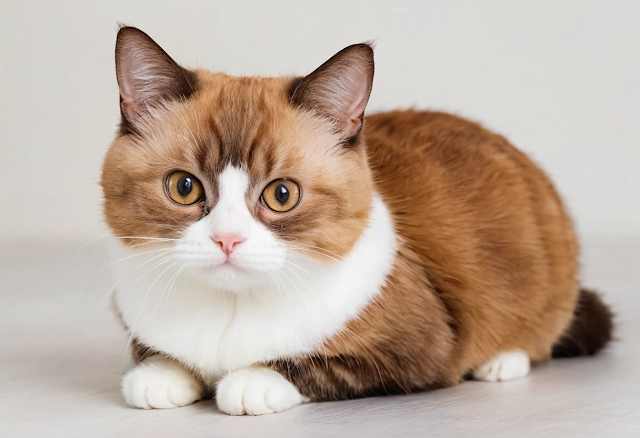Health and Happiness: Ensuring Well-being for Your Munchkin Cat
Provide insights into common health issues and preventive care measures for Munchkin cats, promoting their overall health and longevity.
Munchkin cats, with their endearing short legs and playful demeanor, have captured the hearts of cat lovers worldwide. Originating from a natural genetic mutation that results in their unique stature, Munchkins exude charm and curiosity in equal measure. Their short legs, reminiscent of those belonging to Dachshunds, give them an adorable appearance that adds to their appeal. However, behind their cute exterior lies a breed prone to specific health concerns that require careful attention and proactive management.
Munchkin cats, often referred to as the "dachshunds of the cat world" due to their short legs, have gained popularity for their unique appearance and playful personalities. Originating from a natural genetic mutation, Munchkins are a relatively new breed, but they have quickly captured the hearts of cat enthusiasts worldwide. Despite their endearing charm, Munchkin cats are not without their health concerns. In this comprehensive guide, we will delve into the common health issues faced by Munchkin cats and explore preventive care measures to ensure their well-being and longevity.
Common Health Issues:
Orthopedic èProblems:
One of the most well-known health issues in Munchkin cats is related to their unique skeletal structure. Due to their short legs, Munchkins may be predisposed to orthopedic problems such as lordosis (excessive curvature of the spine) and pectus excavatum (depression of the chest). These conditions can cause discomfort and mobility issues, although not all Munchkin cats will experience them.
Obesity:
Like many other breeds, Munchkin cats are at risk of becoming overweight or obese if their diet and exercise routine are not carefully managed. Their shorter legs may exacerbate the health consequences of obesity, including joint strain and decreased mobility. Maintaining a healthy weight is crucial for preventing obesity-related health problems and promoting overall well-being.
Dental Issues:
Dental health is another area of concern for Munchkin cats. Their short jaws may lead to overcrowding and misalignment of teeth, increasing the risk of dental problems such as periodontal disease and tooth decay. Regular dental care, including tooth brushing and professional cleanings, is essential for maintaining good oral hygiene and preventing dental issues.
Respiratory Problems:
Some Munchkin cats may experience respiratory issues due to their unique body shape. Breathing difficulties, wheezing, and snoring may occur, particularly in cats with more extreme leg shortening. Respiratory problems can impact their quality of life and may require veterinary intervention to manage symptoms effectively.
Preventive Care Measures:
Regular Veterinary Check-ups:
Schedule routine wellness exams with a veterinarian experienced in caring for Munchkin cats. These check-ups allow for early detection of any health issues and enable proactive management strategies to be implemented. Your vet can also provide guidance on nutrition, weight management, and other aspects of your Munchkin cat's care.
Balanced Diet:
Provide a high-quality, balanced diet that meets your Munchkin cat's nutritional needs. Avoid overfeeding and choose cat food that is appropriate for their age, weight, and activity level. Monitor their food intake and adjust portion sizes as needed to maintain a healthy weight.
Weight Management:
Monitor your Munchkin cat's weight regularly and take steps to prevent obesity. Provide opportunities for exercise and mental stimulation to keep them active and engaged. Interactive toys, climbing structures, and puzzle feeders can help keep them entertained and physically fit.
Dental Care:
Practice good dental hygiene by brushing your Munchkin cat's teeth regularly to prevent plaque buildup and gum disease. Offer dental treats or toys designed to promote dental health. Schedule professional dental cleanings as recommended by your veterinarian.
Environmental Enrichment:
Create a stimulating environment for your Munchkin cat with plenty of opportunities for play and exploration. Provide scratching posts, toys, and perches to keep them mentally and physically stimulated. Rotate toys regularly to prevent boredom.
Monitor Breathing:
Keep an eye on your Munchkin cat's breathing and watch for signs of respiratory distress, such as wheezing or labored breathing. If you notice any concerning symptoms, consult your veterinarian for further evaluation and treatment.
In conclusion, while Munchkin cats may have a predisposition to certain health issues due to their unique physical characteristics, proactive preventive care measures can help mitigate these risks and promote their overall health and longevity. By prioritizing regular veterinary check-ups, maintaining a balanced diet, managing weight, practicing good dental care, providing environmental enrichment, and monitoring respiratory health, you can ensure that your Munchkin cat lives a long, happy, and healthy life. With proper care and attention, your Munchkin companion will continue to delight you with their playful antics and affectionate nature for years to come.
.jpg)








